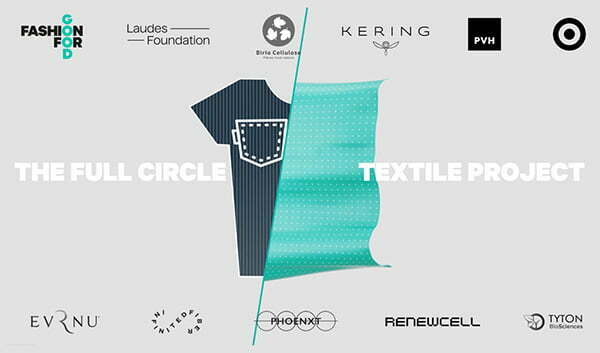This website uses cookies so that we can provide you with the best user experience possible. Cookie information is stored in your browser and performs functions such as recognising you when you return to our website and helping our team to understand which sections of the website you find most interesting and useful.

Fashion for Good and Laudes Foundation embark on a new frontier in chemical recycling
Laudes Foundation September 11, 2020
As much as 73% of the clothing we produce is sent to landfill or is incinerated and of all new clothing made, less than 1% of material used comes from recycled sources. Laudes Foundation is supporting Fashion for Good’s Full Circle Textiles Project: Scaling Innovations in Cellulosic Recycling, a first of its kind consortium initiative to address this issue. Focusing on cellulosic fibres, this initiative aims to validate and eventually scale promising technologies in chemical recycling from a select group of innovators. We are delighted to be joined by leading global organisations Birla Cellulose, Kering, PVH Corp. and Target to explore disruptive solutions together, with the goal of creating new fibres and garments from used clothing and ultimately drive industry-wide adoption.

The initiative’s overall aim is to investigate economically viable and scalable solutions for cellulosic chemical recycling to enable a closed loop system converting textile waste – of cotton and cotton-blend materials, to produce new man-made cellulosic fibres.
Over an 18-month period, initiative partners will collaborate with innovators, Evrnu, Infinited Fiber Company, Phoenxt, Renewcell and Tyton BioSciences, to validate the potential of their technologies in this still nascent market. The recycled content produced by four of these innovators will be converted at Birla Cellulose’s state of the art pilot plants to produce high quality cellulosic fibres. From there, fibres will move through the initiative partners supply chains to be manufactured into garments. Given that Infinited Fiber Company produces industry-ready fibre through their process, their fibre will be delivered directly to the initiative partner’s supply chains for garment production. The Full Circle Textiles Project will provide an assessment of the innovator’s environmental impact, technologies, recycled output and subsequent garments. These results along with the initiatives key learnings should determine how best to support and scale these promising solutions.
A systemic change towards circularity will ultimately reduce the environmental impact of textile waste and potentially eliminate our dependence on virgin materials entirely. Furthermore, producing man-made cellulosic fibres through chemical recycling can help preserve ancient and endangered forests.
“Next generation solutions are the path to meeting the climate and biodiversity targets that scientists are calling for by 2030. We’ve seen promising momentum in recent years as we’ve worked with brands, producers and innovators to build strong market demand and Identified a great pipeline of game changing technologies. Now we need investment and broad industry adoption to make these Next Gen Solutions a commercially available reality.” – Nicole Rycroft Founder and Executive Director, Canopy
Scalable solutions in high quality textile recycling technologies are therefore urgently needed. Chemical recycling is one such solution; however, the technology has a number of barriers to overcome including a lack of financing, relatively small-scale output and limited offtake commitment from brands.
In order to have disruptive solutions widely implemented, the industry needs consortiums of brands, supply chain partners, innovators, and investors with a shared technology focus to concentrate resources and de-risk investments.
“Chemical recycling faces multiple barriers to scale and industry adoption; a key barrier being risk-tolerant investment for innovations that can enable testing, refinement and scale. We hope that our investment in the Full Circle Textiles Project will enable wider adoption and catalytic investment across the industry to map the course of change together.” – Anita Chester, Head of Materials, Laudes Foundation.
Through this initiative and its consortium, Laudes Foundation and Fashion for Good hope to inspire other stakeholders to follow suit in supporting chemical recycling innovators to trial and ultimately secure offtake, catalysing the transformation to a truly circular economy.
“A bold approach is needed to identify and scale innovations that drive sustainable change in the fashion industry. This multi-stakeholder consortium, a first-of-its-kind, addresses the most important barriers to scaling innovation, setting the precedent for all industry players with ambitions for disruptive innovation to follow.” – Katrin Ley, Managing Director, Fashion for Good


